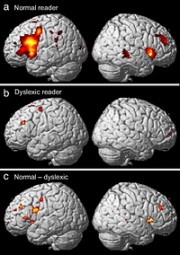 Proceedings of The National Academy of Sciences The images, made using functional magnetic resonance imaging, show brain regions with significant activation during a rhyming task. (a and b) The cortical activation associated with rhyme judgment contrasted in normal and dyslexic Chinese readers. (c) Brain regions showing group differences during rhyme judgment.
Proceedings of The National Academy of Sciences The images, made using functional magnetic resonance imaging, show brain regions with significant activation during a rhyming task. (a and b) The cortical activation associated with rhyme judgment contrasted in normal and dyslexic Chinese readers. (c) Brain regions showing group differences during rhyme judgment.
As you know, I read The Wall Street Journal and New York Times pretty religiously. Well, I came across this really fascinating article in the WSJ on “How the Brain Learns to Read Can Depend on the Language” where the article describes with the advent of brain imaging (functional magnetic resonance imaging), researchers have determined that different parts of the brain are used for different languages, such as Chinese vs. English:
“Until recently, researchers who study reading abilities focused mostly on Western alphabets. English and 218 other languages, from Alsatian to Zulu, share variations of the same Latin character set. But that set is only one of 60 writing systems used among the world’s remaining 6,912 spoken languages. Even so, those studies convinced many scientists and educators that the brain’s response to the written word, regardless of the language, is universal. The new research suggests they’re wrong. The schooling required to read English or Chinese may fine-tune neural circuits in distinctive ways. To learn the ABCs of English, we essentially harness our listening skills to a phonetic code. To become literate in Chinese, however, we must make much heavier use of memory, motor control and visual-perception circuits located toward the front of the brain. Children can master the 6,000 or so Chinese characters used in Mandarin and Cantonese text only by laboriously copying them out over and over again, until each abstract form becomes second nature. “We have to recognize that the writing system in China is different, the demands on the brain are different and the characteristics of dyslexia are different,” said Georgetown University pediatric learning specialist Guinevere Eden, who is incoming president of the International Dyslexia Association.”
There has been a lot of research being done in functional MRI, including a lot related to behavioral economics. I wonder if the way that Chinese-language brains develop different from English-language brains? Literally, some differences in the way that Chinese and Americans think could be “Lost in Translation.”
Of course, this is an easy and perhaps politically incorrect as well as illogical argument to be made as to some of the differences we find between China and the United States. (Not long ago, the former Harvard president Lawrence Summers president made the argument that the underrepresentation of women in engineering and some scientific fields may be due in part to inherent differences in intellectual abilities – that didn’t get him too far – and in fact, probably helped him to “resign” more quickly.)
It doesn’t surprise me that Chinese and English may indeed use different parts of the brain. Personally, I find memorizing characters a lot more difficult than remembering words spelled phonetically…(although Chinese grammar is so much easier – no conjugation of verbs!)
- Excited
- Fascinated
- Amused
- Disgusted
- Sad
- Angry








